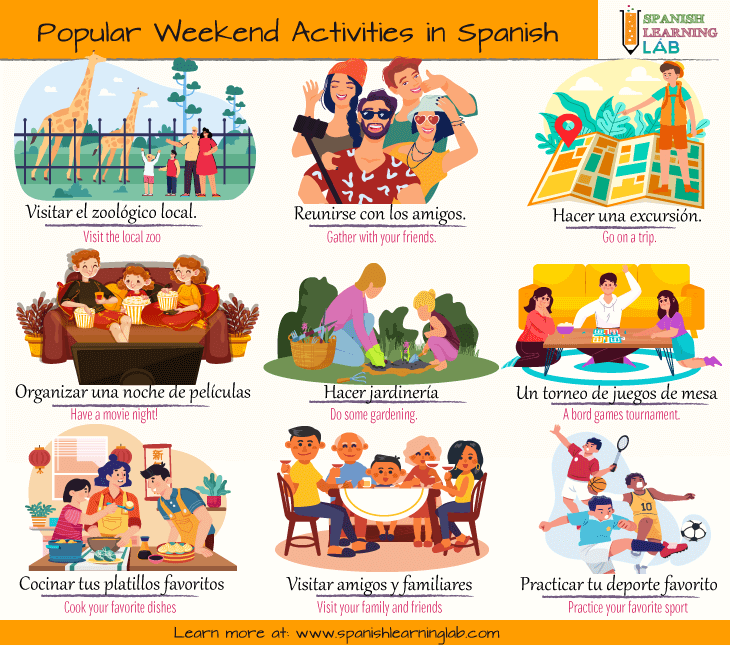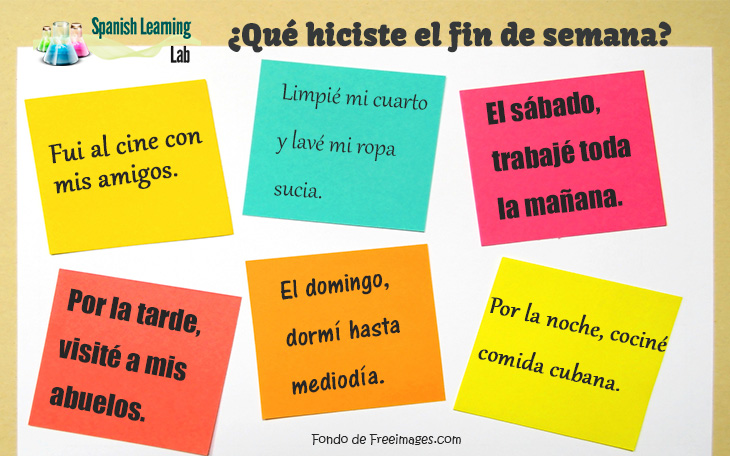Welcome to a new lesson. This time, we will cover some essential phrases and questions to talk about what you did last weekend in Spanish. You will have the chance to read and listen to many examples, and more importantly, practice with two listening activities and quizzes. Let’s start…
Talking about last weekend in Spanish (examples with the past tense)
First, the past tense will be used to talk about last weekend in Spanish – “el fin de semana pasado”. You should know that the past tense in Spanish has two forms, one for actions that were performed and are totally over such as “Fui al cine” (I went to the movies), and one for repeated or simultaneous actions like “Miraba la televisión cuando sentí el terremoto…” (I was watching TV when…). Essays or conversations about the weekend will often use the first structure.
We will not explain how to conjugate verbs in the past tense in Spanish in this lesson because that was covered in detail in a grammar lesson. Instead, we will present key questions and phrases that you can use to have a short, basic conversation about what you did last weekend in Spanish. For this type of conversations, it is a good idea to add sequence adverbs such as “primero”, “luego” and “por último” as they are very useful to tell stories in Spanish. Before heading to the main examples, take a look at the following set of pictures illustrating some popular weekend activities in Spanish.

What I did last weekend in Spanish
It’s time to listen to the first example. Pay attention to how this person follows the rules for the past tense to create a nice paragraph about his weekend in Spanish. The verbs in infinitive in this example are: ser, hacer, estar, arreglar, limpiar, lavar, visitar, platicar, ir, bailar, pasar, dormir y leer.
Lo que hice el fin de semana pasado
El fin de semana pasado fue muy entretenido. El sábado por la mañana, estuve en mi casa e hice los quehaceres. Arreglé mi cama, limpié mi cuarto y lavé mi ropa sucia. El sábado por la tarde visité a mis abuelos. Platicamos un rato y luego fui a comprar ropa. Por la noche, mis amigos y yo fuimos a una discoteca. Bailamos toda la noche y la pasamos muy bien. El domingo dormí hasta mediodía. Por la tarde, leí un libro y por la noche fui al cine.
What did you do last weekend in Spanish?
The second example is a short dialogue about the things someone did last weekend in Spanish. The key question in this short conversation is “¿Qué hiciste el fin de semana (pasado)?” (what did you do last weekend?). You could also ask what he/she did on that specific day with: “¿Que hiciste el sábado?” (what did you do on Saturday?) and “¿Qué tal tu domingo?” (what about Sunday?). The verbs you will see in the dialogue are: estar, tener, hacer, mirar, organizar, invitar, reventar, bailar, jugar, comer, salir, limpiar, poder and pasar.
¿Qué hiciste el fin de semana pasado?
- Carlos: Hola Alberto ¿Cómo estás?
- Alberto: Bien, ¿y tú?
- Carlos: Un poco cansado. Tuve un fin de semana muy ocupado.
- Alberto: ¿Qué hiciste el fin de semana?
- Carlos: Pues mira, el sábado fue el cumpleaños de mi hija. Organizamos una pequeña fiesta de cumpleaños. Invitamos a varios de sus amiguitos. Los niños reventaron una piñata, bailaron, jugaron varios juegos divertidos y comieron pastel claro.
- Alberto: ¿Todo salió bien?
- Carlos: Si, todo salió muy bien. Mi hija estaba feliz.
- Alberto: ¿Qué hiciste el domingo?
- Carlos: El domingo por la mañana limpiamos la casa. Por la tarde, fuimos a un parque de diversiones. Como puedes ver, tuve un fin de semana ocupado con mi familia. Eso sí, la pasamos muy bien… Dime ¿Qué tal tu fin de semana?
- Alberto: Bueno, mi fin de semana…
Listening Activity No. 1: How I spent my weekend in Spanish

Listening Activity No. 2: Talking about your weekend in Spanish
Key expressions in the conversation:
- “Se pasó volando” mean “It flew by”
- “No fue tan entretenido” mean “It was not that fun”
- “Tengo una idea… que te parece?” means “I have an idea… what if we…”
You made it to the end of this lesson. We hope you now have a better idea on how to talk about your weekend in Spanish. Remember that “la práctica hace al maestro” (practice makes perfect). ¡Hasta la próxima lección!
Related Spanish Worksheets:
- Common Irregular Verbs in Spanish
- The Imperfect Tense in Spanish
- The Preterite Tense in Spanish
- Irregular Verbs in Spanish in the Preterite Tense
- Let’s talk about the past in Spanish – Conversation cards
